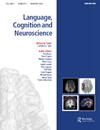增量句子处理是由代理人的偏好引导:来自巴斯克语的脑电图证据
IF 1.8
3区 医学
Q2 AUDIOLOGY & SPEECH-LANGUAGE PATHOLOGY
引用次数: 0
摘要
本文章由计算机程序翻译,如有差异,请以英文原文为准。
Incremental sentence processing is guided by a preference for agents: EEG evidence from Basque
ABSTRACT Comprehenders across languages tend to interpret role-ambiguous arguments as the subject or the agent of a sentence during parsing. However, the evidence for such a subject/agent preference rests on the comprehension of transitive, active-voice sentences where agents/subjects canonically precede patients/objects. The evidence is thus potentially confounded by the canonical order of arguments. Transitive sentence stimuli additionally conflate the semantic agent role and the syntactic subject function. We resolve these two confounds in an experiment on the comprehension of intransitive sentences in Basque. When exposed to sentence-initial role-ambiguous arguments, comprehenders preferentially interpreted these as agents and had to revise their interpretation when the verb disambiguated to patient-initial readings. The revision was reflected in an N400 component in ERPs and a decrease in power in the alpha and lower beta bands. This finding suggests that sentence processing is guided by a top-down heuristic to interpret ambiguous arguments as agents, independently of word order and independently of transitivity.
求助全文
通过发布文献求助,成功后即可免费获取论文全文。
去求助
来源期刊

Language Cognition and Neuroscience
AUDIOLOGY & SPEECH-LANGUAGE PATHOLOGY-BEHAVIORAL SCIENCES
CiteScore
4.50
自引率
13.00%
发文量
70
期刊介绍:
Language, Cognition and Neuroscience (formerly titled Language and Cognitive Processes) publishes high-quality papers taking an interdisciplinary approach to the study of brain and language, and promotes studies that integrate cognitive theoretical accounts of language and its neural bases. We publish both high quality, theoretically-motivated cognitive behavioural studies of language function, and papers which integrate cognitive theoretical accounts of language with its neurobiological foundations.
The study of language function from a cognitive neuroscience perspective has attracted intensive research interest over the last 20 years, and the development of neuroscience methodologies has significantly broadened the empirical scope of all language research. Both hemodynamic imaging and electrophysiological approaches provide new perspectives on the representation and processing of language, and place important constraints on the development of theoretical accounts of language function and its neurobiological context.
 求助内容:
求助内容: 应助结果提醒方式:
应助结果提醒方式:


